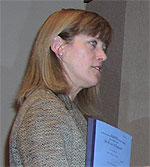By Elizabeth Stawicki
Minnesota Public Radio
March 11, 2002
For the first time in Minnesota history, a former Court of Appeals judge faces five felony counts. Roland Amundson is expected to plead guilty to swindling a vulnerable adult out of $313,000. While Amundson's lawyer says his client will repay the money he stole, repairing damage to the court's credibility may not be so easy.
| |
|
|
|
||
Leaders in Minnesota's judiciary realized years ago that judges are the crucial connection in fostering public confidence in the legal system. Minnesota's courts commissioned a survey two years ago that found the more people understand about the court system, the more they trust and have confidence in it. So several times a week judges, such as Jill Flaskamp-Halbrooks of the Court of Appeals, go off the bench to educate the public.
On a recent day, Flaskamp-Halbrooks talked to teenagers in the Minnesota Legislative Page Program. "Trial courts are divided into 10 different judicial districts all around the state. And so, your communities are located in one of those specific 10 judicial districts..."
Judge Flaskamp-Halbrooks can't talk about Amundson's charges because the case is still pending. But, privately, other judges have expressed anger and frustration. They say Amundson's actions have undermined the public trust they've worked so hard to build through years of outreach.
Former Minnesota Supreme Court Justice Esther Tomljanovich has called Amundson a good friend for 20 years but she says his conduct diminishes the perception of the court.
"It already is something people don't understand. And I think people are already suspicious of judges and the legal system and lawyers. So this does a lot of damage to us," she says.
Judges have a strict standard of ethics; not only are they supposed to act ethically, they're not even supposed to give the appearance of unethical behavior.
The University of Minnesota Law Library says John Todd was the last Minnesota appellate court-level judge to get into serious trouble. Todd resigned his seat on the Minnesota Supreme Court in 1985 after a judicial panel found he cheated on a Florida bar exam.
Legal scholar Steven Lubet, who's studied judicial misconduct says it's rare for judges to break the law. But it does happen.
"There are thousands and thousands of judges in the country and just by the law of averages, a certain number of them turn out to be bad actors," Lubet says.
| |
|
|
|
||
Lubet is a law professor at Northwestern University. He says nationally, authorities charge at least two or three judges a year with felonies. And he says, those charges range widely. He says the worst offense, short of murder, is for a judge to use the office corruptly such as taking bribes in exchange for favorable rulings.
"The next level would be something like theft by swindle, which is a betrayal of trust, which is a very serious problem for a judge who is of course someone whom the public has placed great trust," he says.
Former Justice Tomljanovich says eventually the trust in the judicial system will be fully restored, but it won't be quick. She says the court will have the first opportunity to rebuild that trust by treating Amundson like anyone else charged with a crime.
"There has to be some integrity in the court process. And if the local barber...whatever punishment he would get, that's what Rollie Amundson has to get; it has to be dealt with the same way," Tomljanovich says. "The courts cannot be perceived to do something a little special because after all, he's one of us."
The judge who heads the court's current public-trust efforts says it's difficult to measure one individual's conduct - good or bad - on such a large institution as the court system. Dakota County Judge Ed Lynch says in the final analysis, public confidence in the legal system will hinge on how individuals feel their cases were handled and whether the process was fair to them.
"Most people think court proceedings are too expensive, too complicated and take too long. To the extent we can address some of those core concerns of the people, I think that we'll have a better chance of earning and keeping their trust and confidence," Lynch says.
Law professor Steven Lubet says the Amundson case reiterates what people surely know: judges are human.


